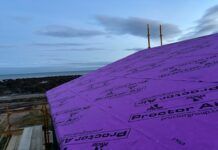BSI, the business standards company, has launched a new Kitemark to help construction manufacturers demonstrate that they have embedded BIM (Building Information Modelling) into their manufacturing processes and are delivering high quality BIM objects.
The new BSI Kitemark for BIM objects will validate that the digital version of a manufacturer’s product is an accurate representation of the physical object. Reportedly, there is currently no third-party BIM certification for manufacturers, although specifiers now require them to provide BIM objects for construction projects.
Manufacturers are said to face a significant challenge in this new era of construction, specifically around the digitization of their products. For example, understanding what information should be provided about their products. The new Kitemark demonstrates that the dimensional, performance and specification data related to the product has been validated and that this is presented and structured correctly, using standardized templates. It also proves that the manufacturer’s processes meet the requirements of BIM and that the object will function properly when placed within a digital model.
In addition, the Kitemark will help designers and specifiers to quickly identify accurate digital objects which are found and searched for within BIM libraries and on manufacturers’ websites. Designers and specifiers will typically use generic objects as placeholders in their designs ¬– however generic objects do not always produce realistic or dimensionally accurate designs compared to the use of manufacturers’ objects. By verifying the BIM object beforehand, the accuracy of the design and installation can be improved, significantly reducing the cost and time associated with returning and replacing products that don’t fit the original specification, as well as time spent sourcing and validating data.
Steve Skeldon, product manager at Wavin, said: “Wavin are delighted to be one of the first construction product manufacturers to be awarded the new BIM Kitemark. Meeting and exceeding customer expectations for BIM has required significant investment and commitment over the last few years. With so many providers of BIM services in the market often giving different advice, this new Kitemark represents a real watershed for the industry by bringing into play a robust, consistent and objective set of BIM parameters for product data.”
Andy Butterfield, director of Built Environment, Product Certification at BSI said: “The overall aim of BIM is to help companies to carry out more efficient methods of design and construction, ultimately driving out waste and inefficiency. This Kitemark has been developed to gives architects and designers the assurance that the BIM objects they are choosing for their projects accurately represent the physical product, reducing the number of checks they will need to undertake throughout the project.
“The manufacturing industry is highly competitive, therefore it’s really important that manufacturers can differentiate their construction products when tendering for BIM projects and to gain access to new markets. BIM is here to stay and manufacturers need to ensure that they are prepared ¬– we believe this new Kitemark will help manufacturers to do that.”
In order to achieve the BSI Kitemark for BIM objects, manufacturers will be independently assessed against the requirements of BS 8541 Library objects for architecture, engineering and construction (parts 1, 3 and 4*) by BSI’s technical BIM experts. As with other Kitemarks, organizations holding the Kitemark will be routinely assessed. The BSI Kitemark for BIM objects is available to all manufacturers that have a quality management system equivalent to ISO 9001, the Quality Management Systems standard.



